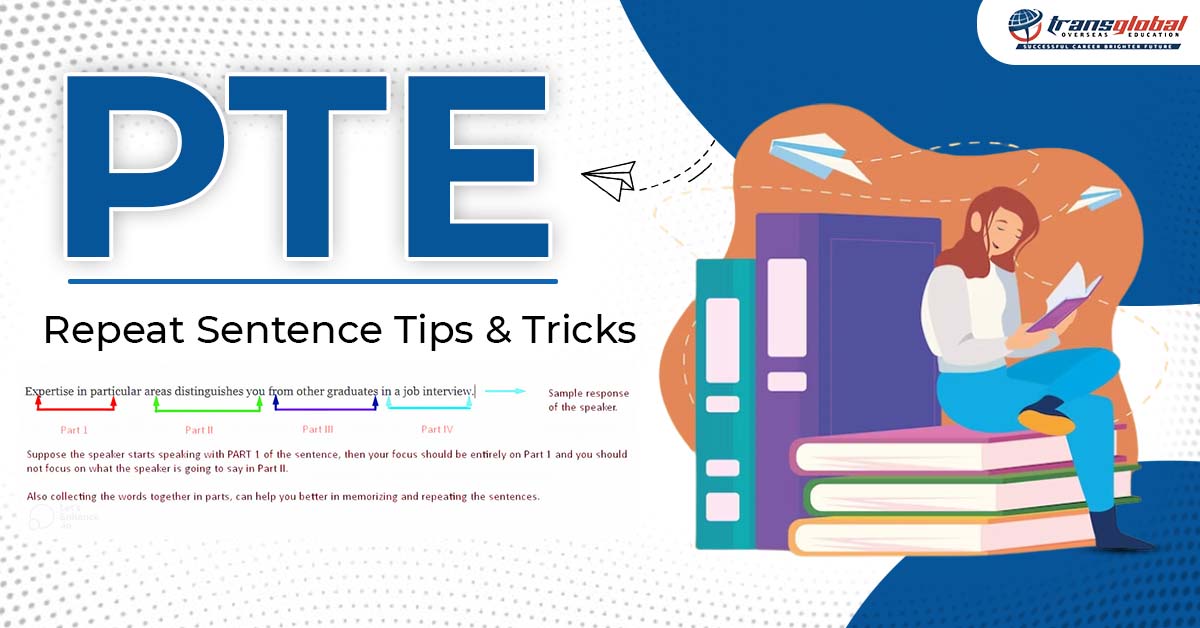The PTE Academic (Pearson Test of English Academic) is a famous English language proficiency test for students aiming to study abroad. One of the challenging sections of the PTE Speaking test is the Repeat Sentence task. In this task, you listen to a sentence and then repeat it exactly as you heard it. This task tests your listening, memory, and speaking skills simultaneously. To help you ace this section, we've compiled some valuable PTE Repeat Sentence tips and tricks.
Active Listening is Key:
- Focus on Content: Pay close attention to keywords, technical terms, and the overall structure of the sentence. Grasping the meaning enhances recall.
- Discern Delivery: Observe the speaker's intonation, pauses, and emphasis. Matching these elements in your response demonstrates a nuanced understanding.
Sharpen Your Recall:
- Visualize the Sentence: Briefly picture what the sentence describes. Engaging your visual memory aids in retaining information.
- Selective Note-taking (Optional): If helpful, jot down key points during the short pause before speaking. However, prioritize active listening to avoid missing crucial details.
Speak with Confidence:
- Clarity is Paramount: Articulate each word clearly and maintain a steady pace for optimal comprehension.
- Mimic, Not Replicate: Replicate the intonation and rhythm of the speaker, but avoid mimicking their accent. Speak naturally within your pronunciation style.
- Silence Before Speaking: Wait for the microphone activation signal before commencing your response. Speaking prematurely leads to lost marks.
Practice Makes Perfect:
- Utilize Online Resources: PTE practice tests and online platforms offer a wealth of audio recordings designed explicitly for the Repeat Sentence task.
- Record Yourself: Speak along with practice tests and recordings, then assess your performance. This allows you to identify areas for improvement.
Remember:
- The Repeat Sentence assesses both Listening and Speaking skills. By excelling in this task, you demonstrate your ability to comprehend and reproduce spoken English accurately.
- Stay calm and composed during the test. Taking a deep breath before attempting the Repeat Sentence can help you focus and deliver a clear response.
Mastering the PTE Repeat Sentence tips requires strong listening skills, effective memory techniques, and regular practice. By incorporating these tips, you can boost your PTE score.
For structured guidance, consider enrolling in PTE coaching in Delhi. At Transglobal IELTS Training Academy Delhi, our expert trainers provide top-notch coaching to help you excel in every section of the test. Whether you need assistance with listening, pronunciation, or test strategy, we're here to support you every step of the way.
Start practicing, stay consistent, and watch your PTE scores soar! With the proper preparation and support, your dream of studying abroad is within reach.
FAQ’s
What's the big deal about the Repeat Sentence?
The Repeat Sentence is a PTE double whammy! It tests your listening (understanding) and speaking (reproduction) skills. Nailing this section shows that you can grasp complex sentences and deliver them accurately.
I struggle to remember the whole sentence! Any tips?
Don't sweat it! Focus on critical points. Imagine the sentence in your head like a picture – it can jog your memory. Optionally, jot down a quick keyword or two during the short pause before speaking. Just remember, listening is still king!
Should I speak with the same accent as the speaker?
There is no need to mimic the accent! Focus on replicating the intonation and rhythm of the sentence (think pitch ups and downs). Speak naturally in your accent for clear communication.
What if I mess up a word or two?
Don't panic! The test assesses overall accuracy, not perfection. As long as your meaning is clear and most of the sentence is correct, you should be okay.
How can I practice for the Repeat Sentence?
Practice makes perfect! Many online PTE resources offer audio recordings designed specifically for the Repeat Sentence task. You can also record yourself speaking along with these recordings to identify areas for improvement.






Comments